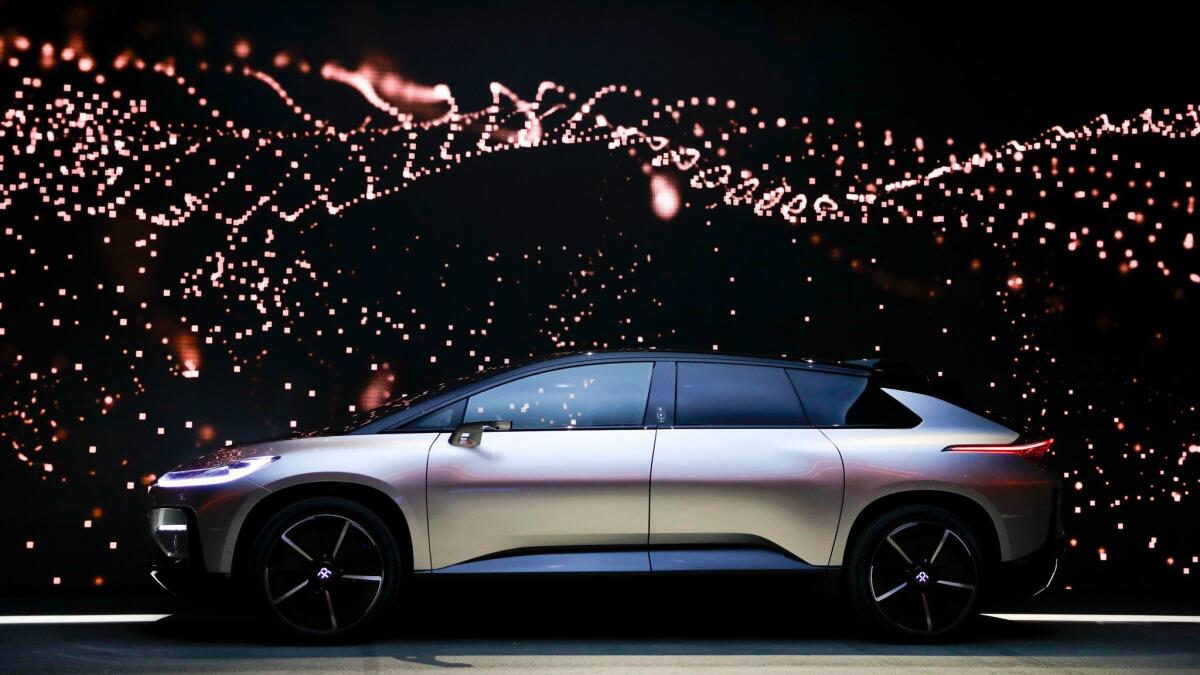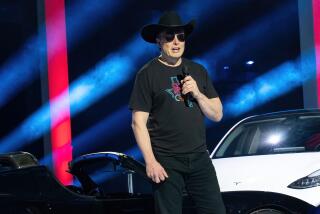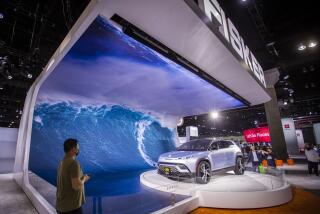Desperate for cash, Tesla competitor Faraday Future scales back plans yet again

Reporting from San Francisco â Faraday Futureâs future continues to fade.
The Chinese-funded, Gardena-based electric-car start-up said Monday that it is scaling back its already scaled-back plans.
The potential Tesla competitor had abandoned plans to build a 3-million-square-foot factory in North Las Vegas, and said it would build a 1-million-square-foot plant instead. Now, the cash-starved company said itâs searching for an existing building to produce its luxury FF 91 electric car.
The search for cash is more pressing, however. The companyâs primary funder, Chinese entrepreneur Jia Yueting, is in deep financial trouble. Assets belonging to him and and his wide-ranging technology company, LeEco, have been frozen by courts in China and elsewhere in the face of unpaid loans.
Months ago, Faraday sought to publicize its search for $1 billion in new funding, apparently to no avail.
The FF 91 prototypes hand-built by Faraday are loaded with advanced technology, propelled by electric motors with over 1,000 horsepower, and designed with unusual space alien body contours. The company has called it a ânew speciesâ of automobile and has never disputed rumors of a $100,000-plus price.
Longer than a 1985 Lincoln Continental, the FF91 was designed âfrom the inside outâ to put special emphasis on roomy back seats that resemble a sleeker version of a dentistâs chair. The seats recline amid a surfeit of video screens and embedded electronics.
Side panel lights shaped like the Faraday logo flash blue to let pedestrians know that itâs being driven in autonomous robot mode.
A company spokesman said âspeed to marketâ is the motivating force behind the new factory plan.
The original $1-billion factory was intended for North Las Vegas, financed in part with subsidies from Nevada state government. Republican Gov. Brian Sandoval continued to support the project even as the stateâs treasurer, Dan Schwartz, also a Republican, warned of fishy financing at Faraday after taking an investigative trip to China.
After the trip last year, Schwartz refused to release hundreds of millions in state subsidies until the company posted $75 million in performance bonds, which it never did.
In November, Aecom â the Los Angeles-based global engineering firm â ceased construction on the Faraday factory after months of unpaid bills. That left a barren graded site where the building was supposed to go.
Meanwhile on Monday, another luxury electric-car start-up in California â Lucid Motors, based in Menlo Park â said its plans to start selling its Lucid Air sedan in 2019 remain on track.
Twitter: @russ1mitchell
UPDATES:
5L00 p.m.: This articles was updated to include a comment from a Faraday Future spokesman.
2:45 p.m.: This article has been updated with details about the FF91 car, the Nevada state treasurerâs refusal to release subsidies for the company, and the cessation of construction on the Faraday plant.
This article was originally published at noon.







